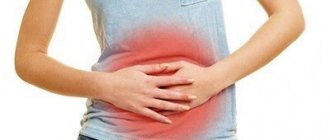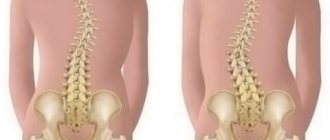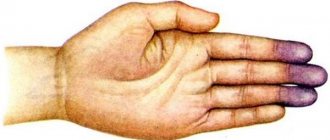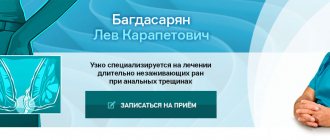Proctitis is an inflammatory disease that is localized in the rectum. First of all, it affects the intestinal mucosa. Very often, proctitis occurs together with sigmoiditis - inflammation of the sigmoid colon (in this case we are talking about proctosigmoiditis).
According to WHO, the risk of developing this disease is observed in 60% of residents of developed countries. Therefore, it is important to remember that early diagnosis plays an important role in the treatment of this disease. Over time, untreated proctitis develops complications and becomes chronic.
At CELT you can get a consultation with a proctologist.
- Initial consultation – 3,000
- Repeated consultation – 2,000
Make an appointment
Causes of the disease
The cause of the disease is the inflammatory process. The reason for the development of the disease can be a variety of factors:
- Excessive consumption of hot foods, spices and alcohol (proctitis of nutritional origin).
- Gonorrheal – occurs as a complication of gonorrhea, usually due to incorrect treatment of the underlying disease.
- “Congestive” – this form affects people suffering from constipation. It may occur against the background of trauma to the intestinal walls.
- Radiation – occurs after a course of radiotherapy aimed at the pelvic organs. Currently, innovative irradiation techniques are used, and the risk of developing radiation proctitis is reduced. Previously, this form of the disease was quite common.
- The parasitic form affects individuals suffering from parasitic intestinal infestations by protozoa and helminths.
There are diseases and conditions that do not directly cause proctitis, but contribute to its development and seriously increase the risk of the disease:
- Hypothermia.
- Inflammation, intestinal injury.
- Haemorrhoids.
- Infectious diseases of the rectum.
- Anal fissures.
- Paraproctitis.
- Abscesses of the intestinal wall.
- Inflammatory diseases of neighboring organs.
- Infectious diseases of the genitourinary system.
Causes of intestinal inflammation after radiation therapy
The following mechanisms underlie radiation damage to the intestine:
- Damage to the intestinal epithelium that develops under the influence of ionizing radiation. This leads to its focal necrosis, desquamation (peeling) and atrophy.
- Development of nonspecific inflammation of the mucous membrane and submucosa. The tissues are infiltrated by neutrophils, hyperemia, swelling, and bleeding are observed.
- Due to trophic disorders (arterioles are damaged), the blood supply to the affected areas of the intestinal mucosa deteriorates, which further aggravates ischemia and necrosis. As a result, atrophic changes progress with the development of fibrosis of the submucosal layer.
- Against this background, pathogenic flora begins to join, which causes infectious complications, including sepsis.
The end result of long-term trophic disorders of the intestinal wall and necrosis is the formation of strictures (narrowing of the lumen), the formation of fistulous tracts, the formation of telangiectasias and the development of bleeding from them.
Symptoms and forms of the disease
Based on clinical manifestations, there are two main forms – acute and chronic. These two varieties most clearly differ from each other in the symptoms and complaints of the patient.
- It begins suddenly, without preconditions or malaise.
- Body temperature rises to 38-40 degrees.
- Chills occur.
- False urges to go to the toilet appear, and at the same time constipation appears.
- Pain in the rectum is often accompanied by a feeling of heaviness.
- There is a burning sensation and itching in the anal area.
- There may be blood in the stool.
Acute proctitis occurs quite rarely, much more often patients present with the chronic form. At the same time, an acute disease occurs with great discomfort for the patient. The patient's subjective sensations are very unpleasant. Symptoms of the acute form force you to consult a proctologist immediately.
There are several morphological forms of acute proctitis:
- Catarrhal hemorrhagic proctitis. This form of the disease is characterized by severe swelling of the intestinal mucosa. Non-systemic submucosal hemorrhages (hemorrhages) occur.
- Catarrhal mucous proctitis is characterized by the accumulation of large amounts of mucus in the intestinal lumen.
- Catarrhal purulent proctitis is characterized by the presence of pus on the surface of the edematous mucosa.
- Separately, the polypous form is distinguished when, upon examination, polyps are detected on the intestinal mucosa.
- Erosive, ulcerative proctitis is a special form. It is characterized by the formation of long-term non-healing erosions and/or ulcers on the rectal mucosa.
Ulcerative proctitis is one of the most severe forms of proctitis. Upon examination, you can find many lesions and ulcers on the intestinal walls. The course of the disease is characterized by the slow spread of the pathological process; inflammation affects one part of the intestine and spreads further. This may be a manifestation of a serious inflammatory disease - nonspecific ulcerative colitis (UC).
Chronic proctitis
The chronic form of the disease is widespread. It occurs unnoticed, so in the first stages of the disease, patients do not rush to see a doctor.
Standard disturbing symptoms are practically absent, often only local discomfort is observed:
- Irritation in the anal area.
- Discomfort before or after bowel movement.
- Burning, itching in the rectal area.
These symptoms do not cause concern in patients at first. Many patients prefer to treat themselves or simply wait. It is important to know that this is a fundamentally wrong approach: without treatment, the pathological process only intensifies. If you do not follow a diet, then “wrong” food in the absence of treatment will provoke increased secretion of mucus and pus, the progression of the disease.
Chronic proctitis can cause many serious complications. In some cases, you will have to resort to surgical treatment. The key to recovery is a timely visit to a proctologist, diagnosis and compliance with all doctor’s recommendations.
How is anal itching diagnosed?
Despite the apparent simplicity of the symptoms of the disease, talking about the presence of itching in the anus and its treatment is possible only after consulting a proctologist. After all, this may be a manifestation of other diseases, so it is necessary to establish the cause of the itching, and in the case of a secondary symptom, only competent specialists can determine the underlying pathology. When diagnosing severe itching in the anus, a wide range of laboratory tests are used.
To establish the probable cause of the malaise, information may be required about the nature and characteristics of itching near the anus, its duration, intensity, and the relationship between the appearance of itching and diet, consumption of spicy foods or alcoholic beverages. Any observation of the patient can contribute to a quick diagnosis, which ultimately leads to a reduction in treatment time for the disease.
During the initial examination, the doctor notes signs of inflammation in the anus and takes a scraping. Also, each patient is required to undergo a three-time stool test to check for the presence of worm eggs.
When women complain of itching near the anus, an additional consultation with a gynecologist is carried out in order to exclude infectious diseases of the genital organs.
In some cases, if men complain of anal itching, an ultrasound examination of the prostate may be indicated.
If stool abnormalities are detected, a bacteriological analysis of stool is performed.
If it is necessary to examine the rectum to identify inflammatory bowel diseases, colonoscopy, irrigoscopy or sigmoidoscopy are performed. Colonoscopy, unlike other examinations, allows us to detect inflammation of the mucous walls of the intestine throughout the large intestine.
Another stage of the study for anal itching is a blood test for sugar content, as well as for the presence of metabolic disorders, which may be accompanied by skin itching.
If functional insufficiency of the anal sphincter is suspected, sphincteromanometry is performed.
If anal itching is accompanied by constant diarrhea or constipation, then in this case it is worth conducting research for the presence of pathologies of the upper digestive tract, such as ultrasound of the abdominal cavity and gastroscopy.
Diagnosis and treatment of proctitis
Endoscopic polypectomy of the intestines and stomach
- Cost: 15,000 - 40,000 rubles.
- Duration: 5-15 minutes
- Hospitalization: 1-3 days
More details
Diagnosis begins with collecting anamnesis. The proctologist interviews the patient, clarifies complaints and the history of the disease. Usually instrumental studies are prescribed, since the chronic form does not have a specific clinical picture and is difficult to recognize only from the patient’s complaints. Diagnostics consists of examination, instrumental studies and laboratory tests. During the examination, the proctologist performs a digital examination of the intestine, anoscopy, and sigmoidoscopy (instrumental endoscopic examination of the rectum).
To assess inflammation, laboratory diagnostic tests are performed:
- Stool tests (coprogram, microflora culture, calprotectin).
- Clinical tests of blood and urine.
- Cytological and histological studies of intestinal material taken during biopsy during examination, and others.
Modern methods of diagnosis and treatment allow therapy to be carried out in an outpatient setting. The patient does not have to be in a medical hospital. First of all, the patient is explained the features of the diet, without which treatment is impossible: avoidance of alcohol, spicy, fried, fatty foods, herbs and spices.
Based on the results of laboratory tests, treatment is selected, including antibacterial therapy (depending on the causative agent of inflammation). Local anti-inflammatory drugs are used in the form of suppositories and microenemas. They help alleviate the condition and relieve the main symptoms.
To combat constipation and maintain normal bowel function, a number of procedures are prescribed: from medications to special exercises. It is generally accepted that proper treatment is a set of measures, each of which is important in its own way.
In some cases, surgical treatment may be used - for example, for polyps. The need and scope of the operation are calculated individually for each case.
How is radiation proctitis treated?
If symptoms of radiation proctitis develop during radiation therapy, a revision of the radiation regimen is required. For mild damage, it is enough to increase the intervals between sessions. In more severe cases, the question arises of reducing the total focal dose or even canceling radiation therapy. In addition, treatment is required, which includes several areas:
- Diet food. An important part of the treatment of post-radiation proctitis is dietary nutrition. Food should contain an increased amount of protein, a sufficient amount of macro and micronutrients. It should also be chemically and physically gentle, i.e. you should avoid spicy, pickled, and canned foods. In addition, coarse plant fiber should be avoided so that it does not injure the already damaged intestinal wall.
- Conservative methods include drug therapy, therapeutic enemas, suppositories, etc. As part of independent treatment, it is used only for mild and moderate pathology; in other cases, it is used as part of complex treatment together with other treatment methods.
- Endoscopic methods - radiofrequency ablation, argon plasma coagulation, etc. Currently, these methods are the gold standard for the treatment of chronic forms of the disease and are mainly used to eliminate bleeding.
- Surgical methods include removal of the rectum with a stoma or coloanal anastomosis. They are used in severe cases when there is a threat to the patient's life. Surgical operations are used to eliminate strictures, fistulas and perforations of the intestinal wall.
Drug therapy for radiation proctitis
The following groups of drugs are used for drug therapy:
- Glucocorticosteroids are the main group of drugs used for moderate and severe proctitis. GCS have a powerful anti-inflammatory effect.
- Analgesics. Different groups of drugs are used, including narcotic drugs.
- 5-aminosalicylic acid (mesalazine) - has an anti-inflammatory and protective effect, thereby protecting the affected mucosa and stimulating its recovery.
- Antidiarrheal drugs. Enveloping and astringent agents and antispasmodics are used.
- Antibacterial drugs. They are prescribed for the treatment or prevention of bacterial complications of proctitis.
Given that the rectum is the terminal part of the digestive tract, many topical drugs are not effective enough when used in forms intended for oral administration. Therefore, preference is given to forms for local use - suppositories, enemas, powders, etc. They act directly on the intestinal wall and have an effect in the shortest possible time.
Surgical treatment of radiation proctitis and radiation injuries of the rectum
Surgical treatment is aimed at eliminating specific symptoms or complications of post-radiation proctitis. This may include continuous bleeding, fistulas and perforations of the intestinal wall, or strictures. Very rarely, surgery is used to relieve uncontrollable pain.
Before planning an operation, it is important to take into account that radiation damage reduces the regenerative capabilities of the tissue, so there is a high risk of complications, including bleeding, poor wound healing, infection and its generalization, as well as long-term negative effects such as severe scarring or anal sphincter failure.
Thus, classical surgical interventions in the acute period are risky, they do not allow complete control of bleeding and can lead to severe, life-threatening complications. Therefore, they are mainly used to eliminate the long-term consequences of radiation proctitis.
Endoscopic treatment methods
Endoscopic treatment methods are safer. They are based on the destruction of the affected part of the intestinal mucosa, followed by necrosis and replacement by healthy epithelium. For this purpose, radiofrequency ablation is used in particular. The method is based on local controlled heating of tissue to produce a thermal burn. The energy source here is radio frequency waves.
During the procedure, a special catheter is inserted into the patient's rectum, which will emit waves and heat the tissue. The standard depth of necrosis is several tenths of a millimeter, so 1-3 pulses are needed to treat one area of the mucosa. The energy intensity is adjusted automatically based on the current temperature of the tissue being treated. This allows you to avoid “overheating” and deep burns.
The advantage of endoscopic treatment is its bloodlessness, a high degree of control during the intervention, and quick results. It is most effective for bleeding. With just one procedure, you can coagulate all pathological blood vessels and stop even heavy bleeding. As a rule, for maximum results, the procedure is carried out 2-3 times at intervals of several months.
Prognosis and prevention
Prevention of the development of complications is the timely treatment of any acute gastrointestinal diseases, as well as observation by a doctor and correction of chronic diseases of the stomach and intestines.
The prognosis for proctitis is generally favorable: with proper treatment, it is possible to completely eliminate the manifestations of the acute form of the disease. Treatment of chronic proctitis lasts almost a long time, and episodes of exacerbations are possible. The success of therapy depends on the individual characteristics of the body, as well as on compliance with the treatment plan.
At the CELT clinic, leading specialists consult on your health issues. Polite and friendly doctors will help you recover. The CELT proctology service offers consultations with high-class proctologists. Start treatment on time and you won’t have to suffer from the disease for years.
Make an appointment through the application or by calling +7 +7 We work every day:
- Monday—Friday: 8.00—20.00
- Saturday: 8.00–18.00
- Sunday is a day off
The nearest metro and MCC stations to the clinic:
- Highway of Enthusiasts or Perovo
- Partisan
- Enthusiast Highway
Driving directions









